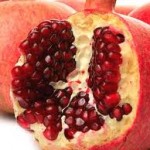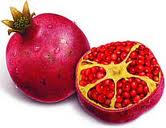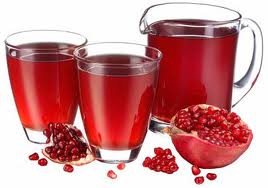Pomegranate: Researchers and Scientists are fascinated with this incredibly healthy and beneficial fruit and its color! There is ongoing research into how this incredible fruit can be used to it’s greatest potential to prevent heart disease, lower high blood pressure, and cholesterol and so much more. The fruit and juice are loaded with the most powerful antioxidants of any other fruit or juice! Pomegranate reduces intestinal inflammation and enriches the blood. Its rich in vitamins C, E, and B6 , contain significant amounts of B1, B2, and niacin. It has minerals such as potassium, copper, and iron. Tannins are plentiful in the rind of the fruit or in the membranes that separate the seed sacs. These tannins have an astringent and anti-inflammatory effect on the mucosa of the digestive tract.
- Intestinal disorders: The pomegranate is suitable in cases of infectious diarrhea caused by gastroenteritis or colitis because of its astringent and anti-inflammatory action on the digestive tract. It is also beneficial in cases of flatulence (excess gas) or intestinal cramps. Surprising results have been achieved in chronic cases such as ulcerative colitis or Crohn’s disease.
- Intestinal parasites: tenia or tape worms in particular for this treatment the BARK which is very bitter or the inner walls of the pomegranate may be used.
- Excess stomach acid: because of the astringent action it reduces the production of gastric juice and reduces the inflammation in the stomach that is irritated.
- Iron deficiency anemia: contains copper that help with the absorption of iron.
- Arteriosclerosis: Its rich content of flavonoids and antioxidant, vitamin (C and E) which halt the arterial aging process. beneficial in heart attack prevention and cardiac health.
- hypertension: Because of the rich potassium contents its helpful to those suffering from hypertension , reduce the systolic and diastolic pressure.
- Metabolic disorders: Pomegranates are good for treating gout, (excess uric acid), and obesity because of its alkalizi
 ng and depurant effect.
ng and depurant effect.
Source: Foods that Heal by George D. Pamplona-Roger,M.D.



Pingback: Astringents: Persimmon | Living Notes of Life()